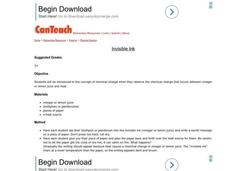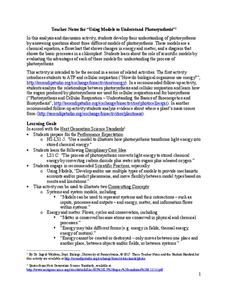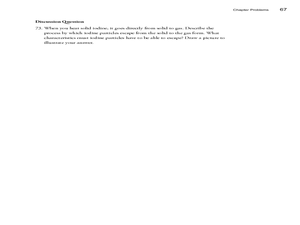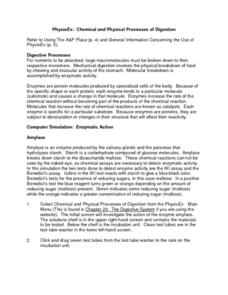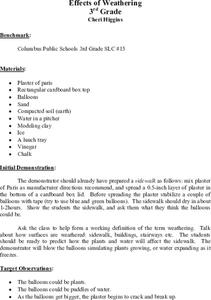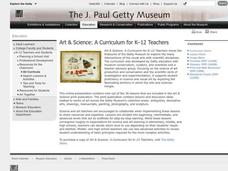Curated OER
Osmosis
Learners investigate osmosis and diffusion in a liquid environment. For this osmosis lesson plan, students use dialysis tubing made into bags and filled with 3 different solutions. They observe the movement of water molecules into higher...
Curated OER
It's Alive! Using Microorganisms in Cooking
Students create a KWL chart about food. In this chemistry lesson, students differentiate physical and chemical changes. They explain how microorganisms are used in food preparation.
Curated OER
Unit 1 Matter and Energy
Topping this worksheet is a comprehensive collection of notes about phase changes. The phase change graph is displayed, along with formulas for the gas laws, and information relating energy to change of phase. After reviewing these...
Curated OER
Sometimes, solid + liquid = gas
Third graders experiment with common household liquids and solids. In this chemical reaction lesson, 3rd graders discuss phase changes and experiment to find other ways to create gases. They use water, vinegar, lemon juice, flour, baking...
Curated OER
Blast Off
In this physical science exploration, small groups place a piece of antacid tablet into a film canister and step back to time how long it takes for the top to pop. They repeat the activity, altering either the amount or temperature of...
Curated OER
What is Energy? Different Kinds of Energy
Introduce physical science learners to the forms of energy using this PowerPoint. The concluding slides present scenarios for discussing the transfer of energy from one form to another. Informative text is crisp and attractive, but the...
Curated OER
Invisible Ink
Pupils are introduced to the concept of chemical change when they observe the chemical change that occurs between vinegar or lemon juice and heat.
Serendip
Using Models to Understand Photosynthesis
Is your class in the dark about photosynthesis? Shed some sunlight on an important biological process with a thoughtful activity. After answering questions to help determine their level of knowledge, learners work with chemical equations...
Curated OER
Science: The States of Matter
Third graders conduct experiments in matter to create chemical changes resulting in gases. By mixing solids and liquids, they create a chemical reaction and capture the gas in balloons. After observing the balloons fill with carbon...
Curated OER
The Structure of Matter and the Chemical Elements
For this chemistry worksheet, students answer 73 fill in the blanks and multiple choice questions on the structure of matter and properties of elements in the periodic table.
Curated OER
PhysioEx: Chemical and Physical Processes of Digestion
In this anatomy worksheet, pupils complete 22 review questions in the format of short answer, table completion, and fill in the blank after finishing an online virtual experiment about the chemical and physical processes of digestion.
Curated OER
Ziplock Chemistry
Students investigate various chemical reactions when creating mixtures in ziplock baggies. In this chemistry instructional activity, students will recognize various chemical reactions and cite evidence. Safety and assessment strategies...
Science Geek
Basic Thermochemistry
Heat is more than just temperature, as viewers discover throughout a presentation about thermochemistry that emphasizes vocabulary. Definitions include joule, calorie, energy, enthalpy, calorimetry, exothermic and endothermic process,...
Curated OER
Effects of Weathering
Here's a great geology lesson for 3rd graders on weathering and erosion of soil. After a class discussion on how nature can "move a mountain," learners take a look at how a modern phenoma called acid rain can also cause weathering and...
Curated OER
The Chemistry of Ceramics
Learners compare the characteristics of a fired porcelain sculpture to the clay used to create it. They discuss the physical and chemical changes that occur in the clay as it is heated and then create their own clay sculpture. This...
Curated OER
Chemical or Physical Change?
Eighth graders participate in several science activities to note chemical or physical changes after discussion. They understand that all matter has definite structure which determines physical and chemical properties.
Curated OER
Changes In Matter, "The Big Chill"
Third graders investigate why ice cream does not go through any chemical changes when it is exposed to physical changes. They describe the three states of matter in either written or verbal form. Then students experiment with ice cream...
Curated OER
The Changing Earth
Learners explore the Earth's crust. In this earth science lesson plan, students participate in 2 activities that demonstrate physical and chemical weathering. Learners also play Jeopardy with topics including volcanoes, earthquakes,...
Curated OER
Properties of Matter
In this properties of matter worksheet, high schoolers answer 6 questions related to matter. They classify and categorize given statements as chemical or physical properties, they identify chemical and physical changes and they find the...
Curated OER
What is Matter?
Students investigate what matter is and how it changes states. In this physical properties lesson, students examine the vocabulary database and identify the characteristics of the three phases of matter. Students perform a liquid vs....
Curated OER
Types of Chemical Reactions Lab
In this chemical reactions activity, students experiment with several different reactions and identify each as a single replacement, double replacement, synthesis, decomposition or combustion reaction. Students observe the changes in...
American Chemical Society
The Energy of Evaporation
Do all liquids evaporate at the same rate? Young scientists observe the evaporation rate of three different liquids. They measure the time, the temperature, and the change in energy. After comparing the chemical formulas, scholars...
Science 4 Inquiry
Maintaining Mass
Can you disprove the law of conservation of mass? Pupils observe the teacher weigh each part of a reaction. Then, the teacher weighs the result of the reaction and everyone sees that the products do not equal the reactants. Then they...
American Chemical Society
Using Color to See How Liquids Combine
Blue-tinted water is added to unknown liquids that have been tinted yellow to find out how they interact. This is a memorable activity that is part of an investigation on the properties of liquids, which is part of a unit on the...








